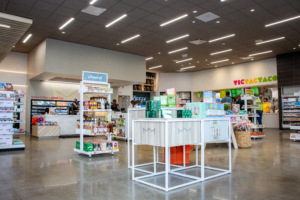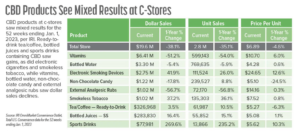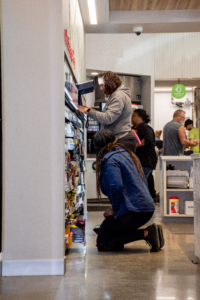
Since its introduction to our retail shelves in 2018, cannabidiol (or CBD as it is commonly known) has gained accumulative growth and popularity among consumers in the US. With an array of products, including gummies, oils, drops, bath bombs, creams, capsules, drinks, and inhalants, CBD products remain in high demand in c-stores. These products have proven to be an asset to the c-store retail space, with a revenue projection reaching $47.20 billion in 2023 (source: cstoredecisions.com). However, just loading up your shelves with CBD products won’t guarantee success, there are a lot of things to consider when introducing or maintaining CBD products in your c-store.
The Legality of CBD by State
The laws surrounding CBD products continue to evolve, adding additional challenges for c-stores:
- With frequent changes in the state and federal law, c-stores must remain informed so as to not offer products against regulations.
- These regulations will influence the options available which impacts purchases and profit. Tracking inventory and sales will help determine the next steps if options are no longer available.
- Due to CBD being highly regulated, black-market sales can become a competition that c-stores should be aware of and try to counteract.
Hemp has been removed from the federal Controlled Substances Act, legalizing CBD that comes from hemp. Although that is the federal ruling, there are a few states that have not removed hemp from their State Controlled Substances Act, making the law differ across state lines. Understanding any restrictions within your state before populating your shelves is imperative. Currently, 47 of the 50 states have legalized the sale and use of hemp-derived CBD products. You can visit this link to see where your state resides on these lists.
Regulations Influence Options
The laws within the state you reside will impact the options you can provide to your customers and these laws can also influence your customer base. Understanding the position of your customers and their use of the product can help guide you on what products to offer. By examining medical versus recreational use in your area, you can help determine social acceptability which can also influence and affect your sales.
Additionally, regulations in different states can add to the increase of black-market competition which can undercut establishments selling the products legally. Law enforcement action on the state mandates can vary by state, depending on staffing and priority, either playing to or against black-market sellers. Legal vendors must pay fees and taxes, creating a challenge to produce comparable costs compared to black-market vendors. However, marketing and promotion of products is something a legal establishment can engage in to neutralize the black-market competition.
CBD Product Trends
With the growing availability of different CBD products, trends have changed over the last five years. The CBD marketplace is regularly evolving with new product releases and brands. Retailers not only must keep up with the product options, but also need to be aware of pending regulations from the FDA and how that may impact consumer demand. Some current product trends of note are:
- 75% of inhalable CBD products saw a usage increase (source: BDSA Cannabis Data Company)
- There was a 27.8% decline in unit sales of CBD topicals (source: Circana)
- According to data provided by Iri, CBD vitamin sales saw a decline in 2022, while CBD sports drinks and bottled juices skyrocketed in demand and popularity.
- Gummies are another popular CBD source, primarily for the millennial generation.
Growing CBD Sales in your C-store

Image source: https://cstoredecisions.com/2023/04/03/cbd-awaits-fda-direction/
The CBD products that you offer in your c-store will depend on your location and your customer base. A good way to evaluate the demand is by offering a handful of products, tracking sales, and assessing what works and what doesn’t. When introducing CBD products into your c-store, consider the following:
- Research and determine stand-by brand(s) to trial and/or use in your c-store.
- Decide which products you want to feature. Generally, c-stores see higher sales of inhalants, CBD-infused beverages, and gummies.
- Determine the right price for each product. With any retail item, consumers are drawn to good value and price points for their CBD products.
- Finding ways to promote CBD benefits and education will help with sales to consumers.
Inventory Control
Inventory control and management go hand in hand with offering legal CBD products within your c-store. Keeping detailed records of CBD products that come in and go out will help you understand product demand and profit. Good ways to establish inventory control are:
- Keep up with changing state and federal legislation affecting CBD product sales.
- Track all purchases with POS systems.
- Perform item-level inventory audits consistently for accurate record-keeping.
- Assess data to determine which products to continue offering and what to discontinue.
Quantum Services specializes in c-store inventory auditing and offers a variety of reporting that can be customized to your c-store, including item-level reporting. By outsourcing inventory audits, the level of human error decreases, and the accuracy of data increases.


Having accurate and consistent data showing the sales of your CBD products allows for smart purchasing decisions as you continue to stock shelves. Quantum Services offers customized audit reporting that can track purchases, products, and shrink so you know what to try next or what to order again. Contact us to see how we can assist you in finding the right CBD products for your shelves!